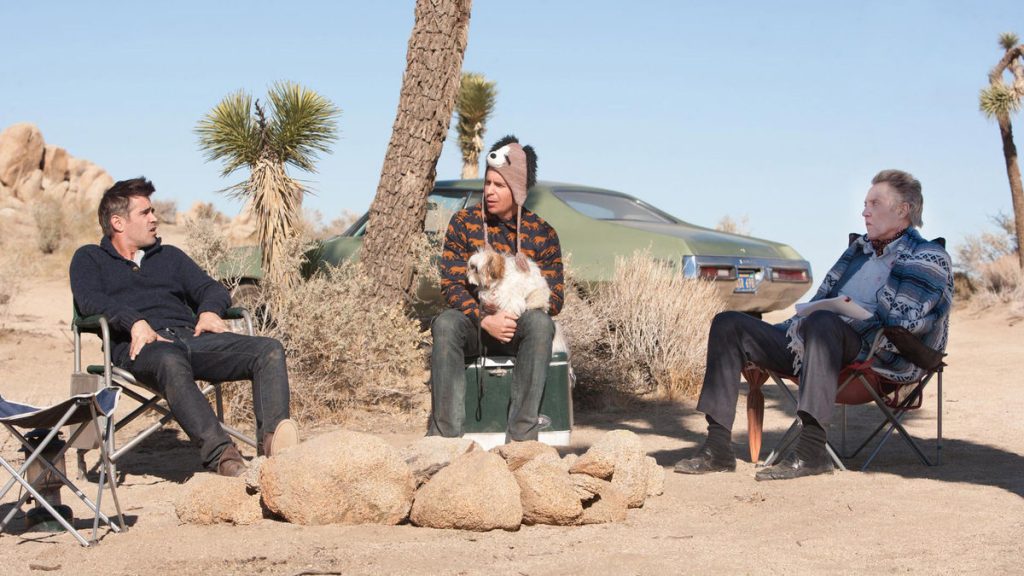Seven Psychopaths (2012)

In Bruges writer-director Martin McDonagh returns with his eagerly anticipated follow-up, Seven Psychopaths, and it is witty, wacky, weird, and woefully awful all at the same time. This time the setting shifts to the United States, in Los Angeles, with a hero that is an Irish screenwriter with an idea for a movie that he doesn’t know where to go with — perhaps a bit of semi-irony that this is the film made by an Irish screenwriter with an idea who struggled to know where to go with it. That’s not to say it isn’t without merit, as McDonagh is an undeniably clever and talented fellow, but in this film it’s a case of a style that’s too clever for its own good.
Colin Farrell (Total Recall, Horrible Bosses) stars as a struggling screenwriter named Marty who has a great idea for his first would-be masterwork, “Seven Psychopaths”, but doesn’t really know where to go with it past the title page. It sure doesn’t help that he spends more time boozing it up, to the chagrin of his mostly fed-up girlfriend, Kaya (Cornish, The Girl), but at least he has best friend Billy Bickle (Rockwell, Cowboys & Aliens) — a nod to Taxi Driver, perhaps? — to rely on in times of need. Billy, an actor who earns his living in a dog-napping scam for reward operation with a snaky older man named Hans (Walken,Balls of Fury), is equally intrigued by the screenplay and wants to help, so much so that he puts an ad in the local paper for psychopaths to visit Marty and tell him their wacked-out stories as fodder for his screenplay. Alas, Billy also incurs the wrath of a really nasty psychopath in the form of hot-headed gangster named Charlie Costello (Harrelson, The Hunger Games), who doesn’t exactly like that his most adored possession, a shih tzu called Bonny, has been lifted by them and he’s going to do anything, and kill anyone, who stands in the way of getting his precious dog back.
As with In Bruges, McDonagh’s film is full of bloody violence and dark humor, some of which works, and at other times, it detracts from the overall momentum of a fun, violent lark. In particular, there are a few characters, many of them women, who are either threatened (if not shot altogether), where the humor factor is completely jettisoned in favor of shades of viciousness or brutality, and which shifts the tone from irreverence to just nasty misogyny. McDonagh even engages in a bit of self-reference for the fact that someone points out to Marty that his roles for women leave something to be desired, which is something that McDonagh must have experienced in In Bruges, and definitely hasn’t figured out in Seven Psychopaths, even though he is aware of the problem. I guess it’s easier to poke fun at your weaknesses than actually have to do something to remedy it.
There are seven psychopaths in the film (numbered for our own count), though a couple of them barely merit being in the film. In particular is the loose end of a Vietnamese psychopath (Nguyen, Six Days Seven Nights), a figment of Marty’s imagination while writing his script, who doesn’t seem to have the war with the United States end in his mind. His character is neither funny nor important to the story, and any scenes involving his character detract from the whole of the film with a dead end to the comedy, and an upraising of the ugliness that mars what could have been the violent romp that In Bruges had been. There’s a recurring gag of a Quaker psychopath that is slightly more amusing, and actually ties into the story we come to find, but even this ends up being mostly a dead end. It’s as if McDonagh had all of these ideas on what might be funny, tossed them in as random brain droppings, and then couldn’t put enough form to it to deliver a satisfying whole, akin to Charlie Kaufman’s often brilliant satire on adapting a nearly inadaptable book in Adaptation.
Seven Psychopaths doesn’t recall Tarantino so much as the post-Pulp Fiction flicks done in the late 1990s by his imitators that were interesting, and even fun. Though the level of violence might suggest Guy Ritchie, perhaps the closest cousin to McDonagh’s film is the underrated 2 Days in the Valley, which had its own ensemble cast of Los Angelinos, including one particular psychopath played excellently by James Spader, and which also features a prominent dog-lover subplot and also revolves around people in the entertainment business, whose works tend to echo the plot going on in the film they are in. If you’re intrigued by the plot of Seven Psychopaths, I would direct you to seek out that film instead, as it actually contains characters that don’t border on annoyance, a tone that doesn’t opt for upping the noise quotient in place of genuine tension, and a blend of violence and comedy that actually is able to work in unison.
McDonagh’s film will have its audience, particularly among people who can ignore the brutality to get to the nuggets of comedy that are within, but for most viewers, the tone is likely to be too chaotic and directionless, not to mention occasionally crossing the bounds of taste, to emerge as anything more than an initially promising misfire.
Qwipster’s rating: ![]()
![]()
![]()
![]()
![]()
MPAA rated: R for strong violence, bloody images, pervasive language, sexuality, nudity, and drug use
Length: 110 min.
Cast: Colin Farrell, Sam Rockwell, Christopher Walken, Woody Harrelson, Abbie Cornish, Kevin Corrigan, Tom Waits, Linda Bright Clay, Zeljko Ivanek
Small role: Michael Stuhlbarg, Harry Dean Stanton, Gabourey Sidibe, Olga Kurylenko
Director: Martin McDonagh
Screenplay: Martin McDonagh
